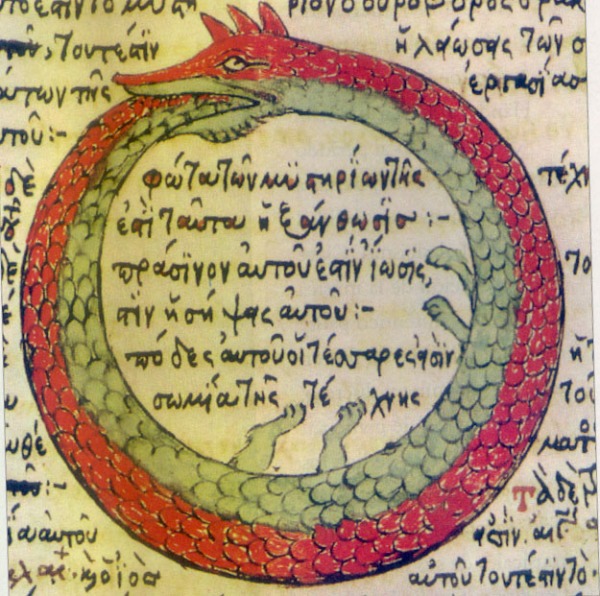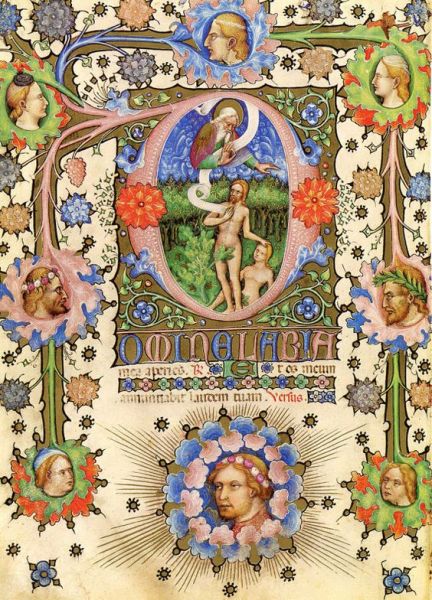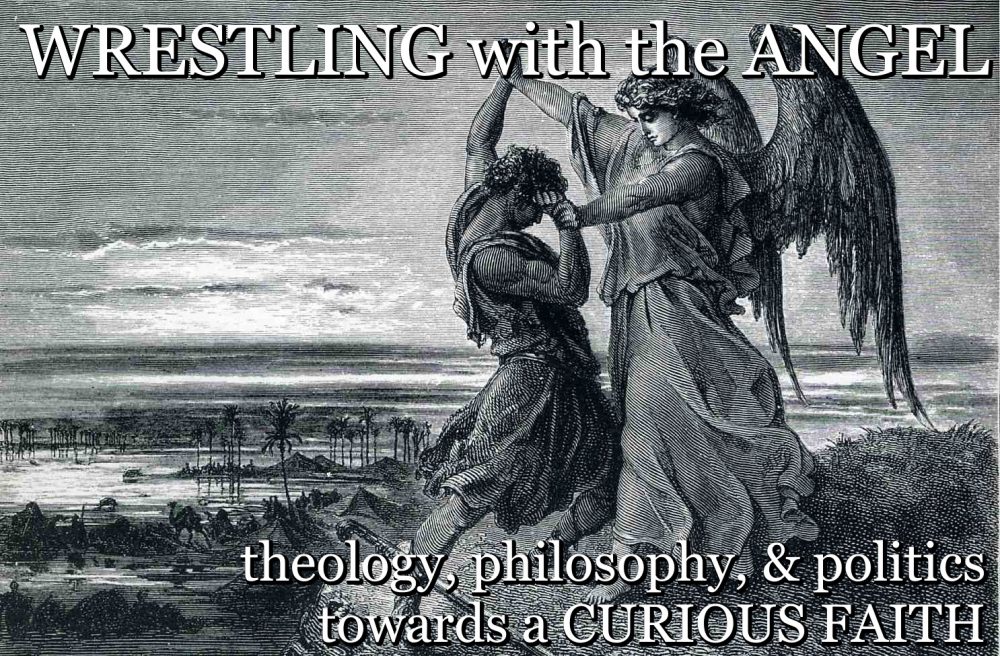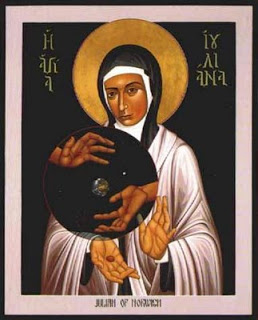 Critics of Christianity and Christian apologists alike tend to approach Christian truth-claims as a set of content which either are, or are not, to be accepted, according to some previously determined–though generally unspoken–set of criteria. Public discourse occurs within various language communities, with sets of rules for determining whether a given argument is received as successful or not. Though individuals, and smaller sub-communities and sub-cultures frequently have their own sets of rules for making some judgments, there are nonetheless cultural logics which are effectively hegemonic, which provide a basic set of axioms and logics that most people, most of the time, employ when making or evaluating public arguments.
Critics of Christianity and Christian apologists alike tend to approach Christian truth-claims as a set of content which either are, or are not, to be accepted, according to some previously determined–though generally unspoken–set of criteria. Public discourse occurs within various language communities, with sets of rules for determining whether a given argument is received as successful or not. Though individuals, and smaller sub-communities and sub-cultures frequently have their own sets of rules for making some judgments, there are nonetheless cultural logics which are effectively hegemonic, which provide a basic set of axioms and logics that most people, most of the time, employ when making or evaluating public arguments.
The actual set of such meta-rubrics, as we might provisionally call them, change over time. For a long period of late antiquity and the early medieval period in western Europe, neo-Platonism provided the basic structure for public reasoning, as witnessed in the works of writers like Augustine or John Scotus Eriugena. In the middle period of the medieval age, Aristotelian logic and metaphysics became ascendent in the west, especially through the work of Thomas Aquinas, who had the benefit of Arabic translations of works lost to Latin. (And it is of course worth noting how much overlap there is between Platoni and Aristotelean modes of reasoning.) At the end of the medieval period, both of these threads–the Platonic, still represented by the work of many Franciscans, like Bonaventure, and the Aristotelean, generally employed by Aquinas’s fellow Dominicans–both faced a crisis of confidence which led to new attempts at “first philosophy”, most notably in the work of Rene Descartes and John Locke. These and other figures of the 17th century ushered in “modern” thought, which has itself both evolved and been challenged by the panoply of critiques covered under the umbrella label of “post-modernism”. Nonetheless, some version of modernism itself still provides, in modified form, the basic set of criteria which most people employ in public discourse.
What exactly qualifies as the basic set of modernism’s truth-criteria is, of course, up for debate, but some basic assumptions like the following are generally seen as uncontroversial: the homogeneity of space and time, the limitation of the real to the perceivable or conceivable, the sufficiency of human reasoning to draw all valid inferences, and the individual thinker as the final arbiter of truth-claims. Each of these has come under some fire from both traditionalists (e.g. Thomists) as well as postmodernism (e.g. Foucault or Baudrillard), but by and large modernism’s basic structure of reasoning remains in force throughout most public discourse today–not only in the West (wherever exactly that is) but, increasingly, throughout the whole world.
Thus, not only the critics of Christian truth-claims but most apologists engage in their rhetorical struggles on this ground. Christian claims are understand as particular content–a set of pronouncements, each of which must be evaluated according to this over-arching meta-logic. While, in one sense, this is unavoidable and is ultimately necessary, I think there is reason to see such an approach to arguing about Christian truth-claims as highly problematic. This is because I think it is a mistake to see Christianity–or indeed any serious political or religious system of thought–as simply a collection of claims to be evaluated by whatever set of logics a given thinker happens to value and employ. Instead, such systems are, well, systematic. Christianity is not just a collection of claims (“there is only one God”, “Jesus is God incarnate”, “Jesus was raised from the dead”, etc.) but rather a complete system of thought–a set of axioms and logics that underpins those truth claims. That is to say: the claims, the content, arrive after one engages in reasoning according to the axioms and logics of the system. If one attempts to make sense of Christian claims apart from Christian axioms and logics, then it is unlikely one will find any of them convincing; indeed, one may not be even able to make sense of some of them in such a context.
Now, this is not to say that making judgments about Christian truth-claims outside of Christian axioms and logics is “wrong”; indeed, this is the whole point: to say that a given argument is wrong, or its conclusion false, or its method invalid, is to make a judgment–and as suggested above, whenever a judgment is made, one should ask: according to what criteria have you made this judgment? Judging, for example, Christian truth-claims according to certain modern logics–especially according to the assumptions of positivism–will yield one set of conclusions, while judging it according to other structures of thought will yield quite different ones. Likewise, judging the act-of-judging Christian truth claims according to, say, certain set of traditional Christian axioms and logics will yield one set of conclusions, while judging this act-of-judging according to modern logics will likely yield another. That’s a huge part of the difficulty in even discussing this issue. When we reason about the criteria we employ to make judgments, we are employing criteria to make judgments–we are making judgments about how to make judgments. The chicken and the egg both arrive on the horizon, but we never reach either.
However, the difficulty in seeing the complexity of this situation only gets worse when we recognize that, actually, few humans only employ one set of totally consistent systems of criteria. Most people employ at least two, and frequently they blend them in unpredictable ways. Thus, many Christians employ one set of axioms and logics when thinking about “religious” issues, but then, at their jobs, employ very different sets. Likewise, many non-religious people employ different sets of reasonings when thinking about scientific questions than they do when thinking about ethical or moral ones. Frequently, the systems of thought are incompatible, to the point of being mutually exclusive (this is actually not the case, I think, between science and religiosity broadly conceived, but consider the gap between evolutionary logic and the political ethics that most people hold dear, and a more glaring inconsistency makes itself clear. But this is a topic for a separate post.)
 So each of us individually, and groups of us as communities, find ourselves attempting to adjudicate various truth-claims, many of which rest on differing assumptions, according to a blended set of axioms and logics, which are often actually rather obscure–that is to say, we often reason without being conscious of the rules according to which we reason. If and when we attempt to reflect on our own processes of reasoning, we find an intellectual mine-field, in which we have to employ the very criteria we wish to observe and study in our studies and observations. Reasoning about reasoning ends up resembling the unfortunate Ouroboros.
So each of us individually, and groups of us as communities, find ourselves attempting to adjudicate various truth-claims, many of which rest on differing assumptions, according to a blended set of axioms and logics, which are often actually rather obscure–that is to say, we often reason without being conscious of the rules according to which we reason. If and when we attempt to reflect on our own processes of reasoning, we find an intellectual mine-field, in which we have to employ the very criteria we wish to observe and study in our studies and observations. Reasoning about reasoning ends up resembling the unfortunate Ouroboros.
Of course, to some extent, this is just repeating some of the critiques leveled at modern logic over the past two centuries by thinkers often grouped together as post-modern (despite that term being largely indeterminate–though again, the difficulty of making sense of this term can’t be dwelled on here). But one should not allow any association with post-modernity–often a term of abuse employed by lazy thought that doesn’t want to truly engage critique–to obscure the real difficulty here. What I hope I have shown above is that the serious, self-conscious evaluation of any truth-claim always comes with an immense amount of baggage. Truth-claims do not sit, pristine and discrete, to be evaluated by some kind of Archimedean Reason. They always exist within a context and system of reasoning and axioms which themselves must be explored if we are to truly understand the original claims. But this is extremely difficult, the work of a lifetime.
Above, we’ve run through an extremely truncated summary of the formal dimension of the difficulty I want to discuss here: we have talked about reasoning in the abstract, outlining how any act of judgment is always an act of applying some particular set of criteria to a given question, and observed that this leaves questions about which criteria to employ wide open. I also claimed that most of us today, most of the time, employ some version of what I loosely called “modern” modes of reasoning to questions, after having suggested that such criteria may not always be appropriate to every question. Now I’d like to apply this formal argument to a particular claim.
The collision of Christian truth-claims and modern criteria of judgment is evident in some of the most basic claims of the faith. The idea that Jesus died but was somehow risen from death and then appeared to his disciples is an excellent example. Modern reasoning, in evaluating this claim, employs some of the basic assumptions listed above. Space and time are assumed to be homogeneous; therefore, any claim about what happened to Jesus must comply with the laws of physics as we now understand them. Likewise, the mechanics of this purported act of resurrection should be understandable to human reasoning. Any appeal to “mystery” is seen as only an attempt to dodge accountability, for all of reality is assumed to be either perceivable or conceivable by human thought. Finally, each thinker him- or herself assumes final authority and autonomy in reaching his or her own conclusion about the matter. Appeals to authority are likely to fall on deaf ears.
What kind of response can a Christian offer? One could attempt to argue each of the above assumptions philosophically, point-by-point. For the sake of keeping this post somewhat briefer, I will employ Scripture itself to model some of the logic that I think informs the Christian claim, to highlight the fact that in the claim about Christ’s resurrection we do not simply have a particular content, a truth-claim, which should be evaluated by whatever reason any given thinker brings to the table, but rather a truth-claim that sits within a broader context, a system not only of other truth claims, but of axioms and logics which anchor those claims. To assert the resurrection of Jesus is to assert a specific way of thinking about reality. Christianity is a way of thinking, not just a collection of content.
 Perhaps the clearest way of pointing to this general system of thought is to appeal to the very opening of the Hebrew Bible. In Genesis chapter one, the cosmos in general and humanity in particular are pronounced “good”; indeed, we humans are said to be made “in the image of God”, the imago Dei. This is not a reference to our bodily form, but rather to our intellectual, moral, and/or spiritual nature and capacities. The upshot of the first creation story, the very opening of Jewish and Christian Scripture, is that reality has not only a descriptive content, but a moral or valuative one as well: it is good.
Perhaps the clearest way of pointing to this general system of thought is to appeal to the very opening of the Hebrew Bible. In Genesis chapter one, the cosmos in general and humanity in particular are pronounced “good”; indeed, we humans are said to be made “in the image of God”, the imago Dei. This is not a reference to our bodily form, but rather to our intellectual, moral, and/or spiritual nature and capacities. The upshot of the first creation story, the very opening of Jewish and Christian Scripture, is that reality has not only a descriptive content, but a moral or valuative one as well: it is good.
Yet the second chapter introduces a wrinkle in this optimistic opening. Something goes wrong, terribly wrong, with the good cosmos. The Accuser, metaphorically imaged by the snake, tempts humanity into transgressing the boundaries that support our very being, and by so doing, the good cosmos is cast into chaos. (The philosophical question here of the problem of evil more generally is one worth exploring, but which I can’t pursue here.) So we have a tension in the text, only a few pages in: in its essence, the cosmos is good, yet in its existence here and now, it is far from good. It is “fallen” from its true state.
These two stories appear themselves as collections of truth-claims about the way in which our world came into being, but they must be seen as providing a philosophical architecture to Jewish–and therefore–reasoning. To claim that the world as it is now is not how it is in truth is to announce an axiom of Jewish and Christian reasoning: Truth cannot be judged only according to how things appear to be for us now. Truth, Truth with a capital “T”, is, to some extent, other than how things currently appear to be. Current existence is a fallen version of Truth.
Once these stories are understood as presenting, through allegory and metaphor, a philosophical system, it should not be hard to see how this touches on our previous discussion of formal systems of reasoning and of the particular question we tackled above: the Christian claim of the resurrection of Jesus. For the axiom just outlined in Jewish and Christian reasoning is in direct conflict with some of the axioms of modern reasoning. Whereas we said that modernism (again, assuming a simple and homogeneous meaning to this thorny term) assumes the homogeneity of space and time, Genesis argues that how things are now is markedly different from how things are essentially. Likewise, by arguing that humanity is itself fallen, Genesis argues that human epistemic capacities–our abilities to perceive, to conceive, and to reason–may themselves be limited, may fall short of being able to fully grasp the Real.
Apart from providing these formal challenges to some of the axioms of modern reasoning, these Scriptural axioms also provide a grounding for understanding claims about Jesus’s resurrection. If in the resurrection, this one part of the fallen cosmos, Jesus’s body, is restored to its essential character as good, as unfallen, then we might expect that it would not “play by the rules”, as it were. Indeed, the fact that Jesus’s resurrection does not play by the rules of being in its mode of existence now is essential to the message. For if one understands the world in its current existence as less than it should be, then only an event that transcends the limits of being as it currently is constituted, the limits that confine being to suffering and dissolution, could possibly be seen as truly manifesting the restoration of being in its essential Truth.
This application of Scripture as a source of axioms and logics shows, I hope, that Christianity–and again, other religious, political, and philosophical systems as well–cannot be understood as simply a set of truth-claims, a disparate content. Instead, the faith must be seen as a system of axioms and logics, as well as the conclusions which are then seen as particular truth claims.
Now, this is not to say that any of what I have said above “proves” Christian claims. Indeed, my whole point here has been to assert that thinking of proof as some kind of absolute and unquestionable conclusion is inherently invalid. Once we recognize that all judgments are made according to sets of accepted criteria, then we can see that any act of “proving” an argument will only prove that argument according to the criteria applied. Proving a point is simply the concluding of an argument according to the axioms and logics accepted at the outset; so long as we ignore that different thinkers can accept different sets of axioms and logics, we will miss the fact that there is no automatic set of criteria that any reasoner must accept. (Here my “postmodern” proclivities are on full display, though this term is even less useful than “modernism”–again, there is much to be said on this score which I cannot pursue here.)
Thus, it is crucial to see that what has been laid out above does not “disprove” modern modes of reasoning. It simply offers an example of an act of reasoning according to different criteria. Now, if one wanted to ask whether there was a process for determining which criteria to accept, that’s a wholly different–and far thornier–question: we would be seeking a criteria for determining criteria, a meta-criteria. For the time being, I would only like to point that even if one accepts the Scriptural criteria of reasoning outlined above–that the existential is not necessarily the finally True–this does not in any way require one to reject modern criteria of reasoning for other questions. That is to say, there is no necessary conflict here between “religion” and “science”. To the extent that one is seeking to understand being as it exists here and now, then modern modes of reasoning seem to be the best tool for the job, considering how much of natural phenomena they have explained and how effectively they allow us to develop new technology. However, if one has questions that move beyond simply how things are, and instead inquire into why things should be that way, or why things should be at all, or as to the value of being as such, then one may find that such modes of reasoning are less useful.
That is to say: it seems clear to me that there are properly scientific questions, which we ought to pursue with scientific (i.e. one specific set of “modern”) modes of reasoning. There may be other questions, however, for which scientific reasoning is not applicable. It is only the assumption, common in the modern period, that all judgments must be adjudicated by scientific modes of reasoning that is being critiqued here. Refuting this position, however, does not necessitate holding that scientific reasoning is never proper for any question. Instead, the refutation of scientific modes of reasoning as hegemonic should lead us to conclude that this mode of modern reasoning is appropriate for some (indeed, many) questions.
It is worth pointing out that this conclusion is relevant to all human thinkers, whether one considers oneself “religious” or not. As suggested above, moral and ethical judgments also fall into the range of questions for which scientific reasoning is not appropriate–though, considering the length of this post already, I will not tackle that claim here.
The upshot of all of this, for an understanding of Christian thought, is this: Christianity is not just content, it is form. Accepting Christianity does not just mean accepting a jumble of truth-claims, but rather a whole system of reasoning. It is not just new wine, but also a new wineskin appropriate for holding that wine. This has far-ranging implications, I think, for Christians struggling to be both “in the world, yet not of the world” (John 17:14-19). We should neither accept that all of our truth-claims can be meaningfully adjudicated by accepted modes of public reasoning nor insist that all questions must be adjudicated by specifically Christian modes of reasoning. Indeed, there may be many questions for which Christian modes of reasoning–which focus on the essential, the eternal, and the moral–are not appropriate.
We can only walk this fine line, balancing differing systems of reasoning for different kinds of questions, however, if we are aware of the often-unspoken assumptions which guide human thought. I hope that in the above, I have contributed to our efforts to not only think well, but also to think self-consciously.

 The latter approach (option “b”) has taken a variety of forms, from (as mentioned above) John Calvin’s Reformed theology as expressed in his Institutes of the Christian Religion, to G.W.F. Hegel’s more or less monist approach in texts like
The latter approach (option “b”) has taken a variety of forms, from (as mentioned above) John Calvin’s Reformed theology as expressed in his Institutes of the Christian Religion, to G.W.F. Hegel’s more or less monist approach in texts like  I’ve spent many paragraphs outlining the problems, complications, and difficulties of various theodicies, but it’s time to start proposing some kind of alternative. In short, I hope to take what I think is best about options “a” and “c” above and combine them with a serious treatment of Satan as presented in Scripture to arrive at a provisional semi-theodicy that I think may be our best option moving forward–though it by no means solves all the problems or answers all the questions.
I’ve spent many paragraphs outlining the problems, complications, and difficulties of various theodicies, but it’s time to start proposing some kind of alternative. In short, I hope to take what I think is best about options “a” and “c” above and combine them with a serious treatment of Satan as presented in Scripture to arrive at a provisional semi-theodicy that I think may be our best option moving forward–though it by no means solves all the problems or answers all the questions. It is often commented that the religious impulse is a manifestation of the human desire to find meaning in all experience, even that experience that is fundamentally meaningless. Evolutionary psychologists, for example, will claim that our distant ancestors faced so much danger from predators (and perhaps also from each other) that highly cautious, borderline paranoid behavior was selected for over the generations. Imagine, for example, that a prehistoric hominid heard a rustling in the bushes. Maybe it’s a hungry lion, or maybe it’s just an aggravated squirrel. Evolution might favor the person who assumes the worst and runs, since, even if they’re wrong, this will only result in a few wasted calories. Meanwhile, the person who sits easy and assumes no danger will pay a much higher price if they are mistaken.
It is often commented that the religious impulse is a manifestation of the human desire to find meaning in all experience, even that experience that is fundamentally meaningless. Evolutionary psychologists, for example, will claim that our distant ancestors faced so much danger from predators (and perhaps also from each other) that highly cautious, borderline paranoid behavior was selected for over the generations. Imagine, for example, that a prehistoric hominid heard a rustling in the bushes. Maybe it’s a hungry lion, or maybe it’s just an aggravated squirrel. Evolution might favor the person who assumes the worst and runs, since, even if they’re wrong, this will only result in a few wasted calories. Meanwhile, the person who sits easy and assumes no danger will pay a much higher price if they are mistaken. “God” is not an answer, but a question.
“God” is not an answer, but a question. Early in our lives, our sensory and mental life is all we can imagine; it fills not only our immediacy but also the boundaries of what we think possible. However things appear, whatever thoughts come to us, that’s reality, as far as we can know or imagine. It doesn’t seem like there could be anything else. As we get older, things start to change a bit. We have new experiences, new ideas, new conceptual relations. We begin to realize that there is more to reality than what appears to our consciousness at any given moment. We come to realize that other people’s experiences could be different–perhaps radically different–from our own, and yet also reflect reality just as truly as our own.
Early in our lives, our sensory and mental life is all we can imagine; it fills not only our immediacy but also the boundaries of what we think possible. However things appear, whatever thoughts come to us, that’s reality, as far as we can know or imagine. It doesn’t seem like there could be anything else. As we get older, things start to change a bit. We have new experiences, new ideas, new conceptual relations. We begin to realize that there is more to reality than what appears to our consciousness at any given moment. We come to realize that other people’s experiences could be different–perhaps radically different–from our own, and yet also reflect reality just as truly as our own. Critics of Christianity and Christian
Critics of Christianity and Christian  So each of us individually, and groups of us as communities, find ourselves attempting to adjudicate various truth-claims, many of which rest on differing assumptions, according to a blended set of axioms and logics, which are often actually rather obscure–that is to say, we often reason without being conscious of the rules according to which we reason. If and when we attempt to reflect on our own processes of reasoning, we find an intellectual mine-field, in which we have to employ the very criteria we wish to observe and study in our studies and observations. Reasoning about reasoning ends up resembling the unfortunate
So each of us individually, and groups of us as communities, find ourselves attempting to adjudicate various truth-claims, many of which rest on differing assumptions, according to a blended set of axioms and logics, which are often actually rather obscure–that is to say, we often reason without being conscious of the rules according to which we reason. If and when we attempt to reflect on our own processes of reasoning, we find an intellectual mine-field, in which we have to employ the very criteria we wish to observe and study in our studies and observations. Reasoning about reasoning ends up resembling the unfortunate  Perhaps the clearest way of pointing to this general system of thought is to appeal to the very opening of the Hebrew Bible. In Genesis chapter one, the cosmos in general and humanity in particular are pronounced “good”; indeed, we humans are said to be made “in the image of God”, the imago Dei. This is not a reference to our bodily form, but rather to our intellectual, moral, and/or spiritual nature and capacities. The upshot of the first creation story, the very opening of Jewish and Christian Scripture, is that reality has not only a descriptive content, but a moral or valuative one as well: it is good.
Perhaps the clearest way of pointing to this general system of thought is to appeal to the very opening of the Hebrew Bible. In Genesis chapter one, the cosmos in general and humanity in particular are pronounced “good”; indeed, we humans are said to be made “in the image of God”, the imago Dei. This is not a reference to our bodily form, but rather to our intellectual, moral, and/or spiritual nature and capacities. The upshot of the first creation story, the very opening of Jewish and Christian Scripture, is that reality has not only a descriptive content, but a moral or valuative one as well: it is good. Apart from healing and feeding people as he traveled through Galilee and Judea, Jesus also spent a lot of time teaching people. Sometimes this meant interpreting the Hebrew Scriptures–explaining or reinterpreting the Law, for example, or quoting and applying passages from Prophetic literature. But frequently, when people ask him a direct question, they ask him about one specific thing: eternal life. “Good Teacher, what must I do to inherit eternal life?” is a frequent refrain (Luke 18, compare John 3, etc.). Jesus spends a good deal of time, then, explaining what humans should do to attain this state of eternal life. But eternal life itself remains more or less un-explained. When Jesus does reference it, he almost always refers not to the state of one human being existing eternally, but to what he calls the “Kindom of Heaven” or the “Kingdom of God”. And when he does start to explain and define this, he invariably speaks not directly, but in parables: “the Kingdom of God is like a mustard seed…”
Apart from healing and feeding people as he traveled through Galilee and Judea, Jesus also spent a lot of time teaching people. Sometimes this meant interpreting the Hebrew Scriptures–explaining or reinterpreting the Law, for example, or quoting and applying passages from Prophetic literature. But frequently, when people ask him a direct question, they ask him about one specific thing: eternal life. “Good Teacher, what must I do to inherit eternal life?” is a frequent refrain (Luke 18, compare John 3, etc.). Jesus spends a good deal of time, then, explaining what humans should do to attain this state of eternal life. But eternal life itself remains more or less un-explained. When Jesus does reference it, he almost always refers not to the state of one human being existing eternally, but to what he calls the “Kindom of Heaven” or the “Kingdom of God”. And when he does start to explain and define this, he invariably speaks not directly, but in parables: “the Kingdom of God is like a mustard seed…” I am a huge fan of
I am a huge fan of  For another, and perhaps the most serious, example, let’s shift back a bit chronologically: Ehrenreich repeats the claim, often found on internet message boards but much less often in any scholarly work on religious history, that there was a deity named “Yahweh” among the Canaanite pantheon whose adherents, at one point, insisted on worshiping to the exclusion of any other deity. The fact is that there is no evidence of any such deity among the pantheon, and indeed, “Yahweh” is not a name at all, but a specific transliteration into Latin characters of the tetragrammaton: YHWH, which is probably best translated as “He Who Is” or “He Who Will Be” or various other statements focused on Being in a more or less absolute sense. This “name” then is actually a sort of non-name, a proposition meant to point to God’s ineffability. The idea that there was a god named “Yahweh” (who was perhaps a storm- or war-god) among the Canaanite pantheon has no firm textual or archaeological basis.
For another, and perhaps the most serious, example, let’s shift back a bit chronologically: Ehrenreich repeats the claim, often found on internet message boards but much less often in any scholarly work on religious history, that there was a deity named “Yahweh” among the Canaanite pantheon whose adherents, at one point, insisted on worshiping to the exclusion of any other deity. The fact is that there is no evidence of any such deity among the pantheon, and indeed, “Yahweh” is not a name at all, but a specific transliteration into Latin characters of the tetragrammaton: YHWH, which is probably best translated as “He Who Is” or “He Who Will Be” or various other statements focused on Being in a more or less absolute sense. This “name” then is actually a sort of non-name, a proposition meant to point to God’s ineffability. The idea that there was a god named “Yahweh” (who was perhaps a storm- or war-god) among the Canaanite pantheon has no firm textual or archaeological basis.
